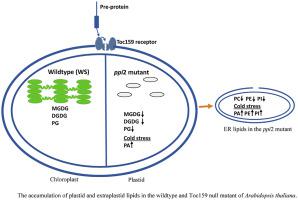Plant Physiology and Biochemistry ( IF 6.1 ) Pub Date : 2020-12-16 , DOI: 10.1016/j.plaphy.2020.12.011 Meshack Afitlhile , Rebecca Worthington , Ghanshyam Heda , Logan Brown

|
We used electrospray ionization tandem mass spectrometry to profile glycerolipids in the TOC159 null mutant of Arabidopsis, which is referred to as plastid protein import 2, or ppi2. The goal was to evaluate the impact of a defective atToc159 receptor in the accumulation of plastid lipids. The ppi2 mutant is severely impaired in the accumulation of monogalactosyldiacylglycerol (MGDG), digalactosyldiacylglycerol (DGDG) and phosphatidylglycerol (PG), which are major components of the thylakoid membranes. Major molecular species of MGDG and DGDG are drastically decreased, which is consistent with our previous findings of decreased levels of hexadecatrienoic and linolenic acids. Under normal growth conditions, the ppi2 mutant accumulated significantly lower levels of phosphatidylcholine (PC), phosphatidylethanolamine (PE), and phosphatidylinositol (PI). In the cold-acclimated mutant, the amounts of PE and PI were similar to the wildtype level, which indicates that the ER pathway of lipid synthesis was functional in the mutant. The cold-acclimated ppi2 mutant accumulated increased amounts of phosphatidic acid (PA), which was mirrored by an increase in phospholipase Dα (PLDα) transcript levels. These data suggest that PLDα activity contributed to the accumulation of cold-induced PA in the ppi2 mutant. The accumulation of major molecular species in PA indicates that cold-induced PA originated from the degradation of both plastidial and extraplastidial lipids. Compared with the wildtype, the ppi2 mutant had a low double bond index and high acyl chain length, which is indicative of decreased membrane fluidity. Taken together, these data indicate that a defective atToc159 receptor severely impaired the plastid pathway of lipid synthesis, which negatively affected the synthesis and/or accumulation of PC.
中文翻译:

拟南芥TOC159无效突变体的质体脂质和磷脂酰胆碱的积累受到损害
我们使用电喷雾离子化串联质谱法以轮廓甘油脂在拟南芥,其被称为的TOC159无效突变体的质体蛋白进口2,或PPI 2的目标是评估有缺陷atToc159受体在质体的脂质的积累的影响。所述PPI 2突变体在monogalactosyldiacylglycerol的积累(MGDG),digalactosyldiacylglycerol(DGDG)和磷脂酰甘油(PG),其为类囊体膜的主要成分严重受损。MGDG和DGDG的主要分子种类急剧减少,这与我们先前发现的十六碳三烯酸和亚麻酸水平降低的发现是一致的。在正常生长条件下,ppi2个突变体的磷脂酰胆碱(PC),磷脂酰乙醇胺(PE)和磷脂酰肌醇(PI)的水平明显降低。在冷适应的突变体中,PE和PI的量与野生型水平相似,表明该脂质合成的ER途径在该突变体中起作用。冷驯化的ppi 2突变体积累了增加量的磷脂酸(PA),这可以通过磷脂酶Dα(PLDα)转录水平的增加来反映。这些数据表明,PLDα活性促进了冷诱导的PA在ppi 2突变体中的积累。PA中主要分子种类的积累表明,冷诱导的PA起源于质体脂质和质外脂质的降解。与野生型相比,ppi 2突变体具有较低的双键指数和较高的酰基链长度,这表明膜流动性降低。综上所述,这些数据表明有缺陷的atToc159受体严重损害了脂质合成的质体途径,从而对PC的合成和/或积累产生了负面影响。











































 京公网安备 11010802027423号
京公网安备 11010802027423号